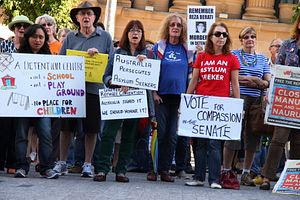After months of government negotiations, a deal is expected to be signed this week to move 1,000 refugees from Australian-run detention centers to Cambodia for permanent settlement.
Australian Foreign Minister Julie Bishop is reported to have met with her Cambodian counterpart Hor Namhong on the sidelines of the East Asia Summit foreign ministers meeting in Myanmar over the weekend.
Meanwhile, Australian Immigration Minister Scott Morrison is said to be travelling to Cambodia later this week to sign off on the deal.
Details of the deal are scarce, as the Australian government has kept negotiations largely under wraps since announcing the plan to send refugees to Cambodia in April.
However it is believed that 1,000 refugees who are currently being held in detention on Nauru will be transferred to Cambodia. For its cooperation, Cambodia will receive financial benefits in the form of aid. While not verifiable the figure being reported is A$40 million ($37 million).
The planned deal has sparked criticism from human rights groups, UN officials, and Australian and Cambodian opposition politicians.
Australia’s opposition Labor Party has slammed the government for its lack of transparency on the issue, while senior Cambodian National Rescue Party politician Son Chhay said Cambodia shouldn’t become a “dumping ground” for Australia’s refugees.
Asian Deputy Director of Human Rights Watch Phil Robertson said that Australia was seeking to outsource its refugee obligations.
“At its core, the Australia refugee dumping deal is all about Canberra violating its rights obligations and paying Phnom Penh to clean up the mess. Prime Minister Tony Abbott and his government should be universally condemned for his central role in trashing the principle of refugee protection in the region,” he said.
While Cambodia is a signatory to the UN Refugee convention, the country has a poor human rights record, and many have argued that Australia cannot guarantee the safety of refugees sent there.
In 2009, Cambodia sent 20 ethnic Uighur refugees back to China while the UN was processing their asylum claims. Four of them were later sentenced to death while the others were given lengthy prison sentences.
The Cambodian Human Rights Action Committee has also been vocal in its opposition to the move, saying that the country was not safe to settle refugees. “There is a serious culture of impunity where Cambodian security forces and government agencies have been known to commit abuses such as killings, torture, and arbitrary detention without being held accountable. Those living on the margins are particularly vulnerable to the abuses.”
The latest move by the government is in line with earlier pronouncements that no asylum seekers who arrived illegally by boat would ever be settled in Australia. In recent times, the Australian government has made arrangements with Papua New Guinea to settle refugees after processing.

































